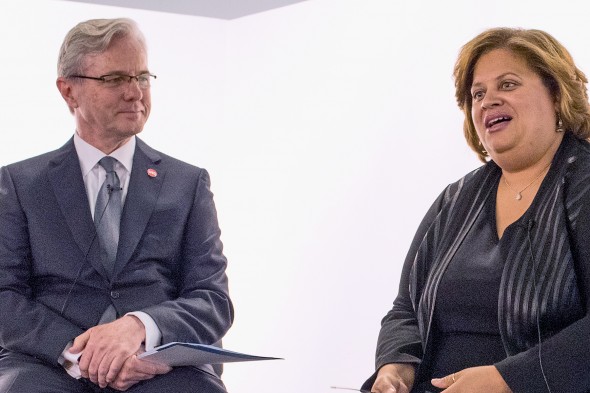Chicago cultural affairs head discusses UIC’s role in city’s plans

College of Architecture, Design, and the Arts dean Steve Everett and Michelle Boone, Chicago cultural affairs and special events commissioner, discuss UIC and the Chicago Cultural Plan. Photo: Joseph Horejs
“I’m impressed to see this full house on such a beautiful day,” said Michelle Boone, commissioner of the Chicago Department of Cultural Affairs and Special Events, speaking to about 80 faculty, students and alumni of the College of Architecture, Design, and the Arts.
The upcoming inaugural Chicago Architecture Biennial, which includes a lakefront kiosk designed by the School of Architecture, has spurred interest in UIC partnerships in Chicago cultural affairs.
Boone was invited to discuss the Chicago Cultural Plan, which includes the new biennial, with CADA dean Steve Everett Aug. 27.
Boone called the plan “a blueprint for policy to support cultural growth.” The last cultural plan, issued in 1983, resulted in daily performances, films and exhibitions at the repurposed Chicago Cultural Center, investments in public art and new grant programs, she said.
The recent plan, created in 2012, called for a festival that would “elevate Chicago as a premier cultural destination.” Boone said architecture was chosen because it’s an art that everyone sees daily, and because the architecture community rallied around the idea.
“Bob Somol was tremendously helpful,” she said, referring to the School of Architecture director, who is on fellowship this semester. “Surprisingly, nothing like this has ever been done in North America.”
Boone said the legacy of the biennial will be four permanent lakefront kiosks. Three will be designed by architects chosen by UIC, the Illinois Institute of Technology and the School of the Art Institute, with participation by each institution’s architecture students.
UIC selected Paul Preissner, principal of Paul Preissner Architects and interim director of the School of Architecture, in partnership with Paul Andersen of Indie Architecture in Denver.
“At least 15 or 20 UIC-connected individuals are involved” in the biennial, Everett said, mentioning former School of Architecture director Stanley Tigerman.
“Actually, Stanley was the inspiration for the theme, ‘The State of the Art of Architecture,’” Boone said. “It’s a riff on a program that Stanley did back in the ’70s — a debate, really.”
The Chicago Architecture Biennial will run from Oct. 3 to Jan. 3. All events are free.
